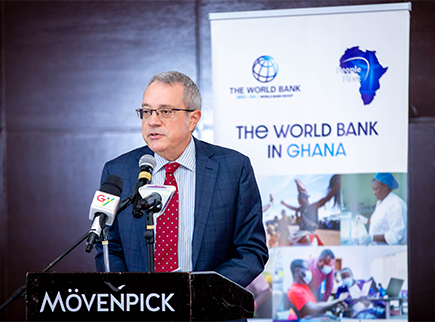The World Bank Group is encouraging Ghana’s government to maintain its momentum on decisive and sustainable fiscal consolidation by paying more attention to expenditure and revenue mobilisation measures.
These measures, according to the group, are crucial to restoring the macro-financial stability needed to support economic transformation.
“Ghana must continue to build policy credibility by maintaining its commitment to macroeconomic stabilisation and consolidating hard-won gains, particularly through the reestablishment of fiscal rules and strengthening of public debt management.
“To ensure fiscal discipline, it is essential to strengthen the fiscal framework and relevant institution,” the group noted in its 2025 policy notes report.
The 144-page report titled, “Transforming Ghana in a Generation” recommended among other things, avoiding large foreign exchange interventions by the Bank of Ghana (BoG); revising the fiscal regime for mining and creating a revenue-sharing mechanism for regions affected by mining activities; and postponing reentering the Eurobond market.
Speaking at the report launch, Mr Robert Taliercio, Division Director for Ghana, Sierra Leone, and Liberia observed that in the past decade, Ghana’s economic and social prospects declined due to rising macroeconomic challenges, culminating in a severe crisis in 2022 that undermined poverty reduction and job creation efforts.
“Ghana’s history is marked by repeated cycles of fiscal expansion followed by sharp adjustments, reflecting recurring fiscal stress and a challenging political economy that have made sustained reforms difficult,” he said.
He noted that internal research had shown that with ambitious reforms, Ghana could more than triple per capita income by 2050—moving it decisively toward upper-middle-income status.
The report also highlighted the need for financial sustainability in sectors with high fiscal risks, contingent liabilities, and quasi-fiscal spending.
For instance, it urges comprehensive reform for COCOBOD to streamline functions and expenditures, reducing costs, and enhancing its profitability.
The World Bank group also called for the overhauling of the Electricity Company of Ghana through private sector participation to improve revenue collection, reduce losses, and enhance billing and revenue management systems.
The 2025 Policy Notes is based on four foundations that include, restore and sustain macro-financial stability; raising productivity and competitiveness to create jobs; sustainable natural resource management and resilience as well as strong governance and public institutions that are fit for purpose.

